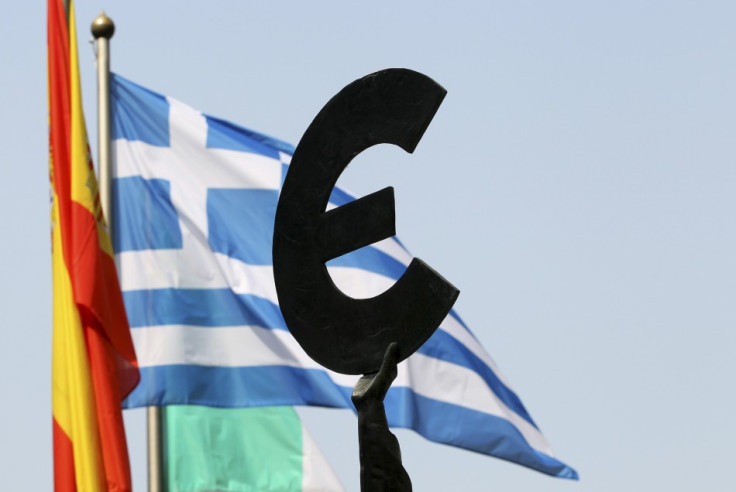'Grexit' Risks Could Lead to 'Lehman Moment' in Eurozone: Societe Generale

If Greece were to leave the Euro, the indirect contagion risks could potentially generate a "Lehman moment" in the eurozone, says Société Générale (SG).
In a special report led by 13 senior analysts, SG also says that these risks could have a domino effect on Italy and Spain's deposit outflows, have a crippling effect on European stock markets while the European Central Bank (ECB) would not be able to cope with a third round of long term refinancing operation (LTRO) and a second round of Securities market programme (SMP) funding.
"Indirect contagion risks (which involve Spain or Italy) have the potential to be far more damaging and could force European equity markets to fall 50 percent," says the SG report. "On top of significant deleveraging due to deposit outflows (20-30 percent as in Greece), a funding gap of €200-400bn in Italy and €145-280bn in Spain would likely emerge. Because indirect contagion risks have the potential to generate a 'Lehman moment' in the eurozone, we strongly believe the euro area's official firewalls will be activated."
"The ECB, however, is heavily constrained, meaning that an LTRO3 or SMP2 is unlikely. Instead, we see the European Stability Mechanism (ESM) being employed to support the weaker sovereigns and potentially to recapitalise European banks," adds SG.
The ECB launched the LTRO in late 2011, as a cheap loan scheme for European banks, which was designed to ease the pressures of the eurozone crisis. The loans are due to be repaid within three years at a rate of 1%. The first round was completed in on 21 December 2011 and resulted in €489bn worth of funding to banks.
The second round in late February 2012. dubbed LTRO 2, saw 800 banks, 277 more than last time, take €530bn from ECB. However the uptake did prompt criticism that banks were now using the mechanism as an easy, cheap and guaranteed, rather than an emergency measure.
The scenario analysis by SG could cause some alarm to the banks that have enjoyed cheap funding from the ECB, but SG says that a growth pact seems likely.
"The toolkit for alleviating liquidity stress within the eurozone's financial system already exists to a degree (another LTRO, perhaps even bond buying)," says SG in the report. "The main tools for relieving sovereign funding stress are 'Firewalls', but Eurobonds would be far better, if only they were politically acceptable in Germany. Giving the ESM a banking license and using it as a conduit to buy government bonds is a plausible half-way house, but not one that is in place yet. All of these issues are discussed at some length in this report. In all cases, the toolbox to limit the effects of contagion can be put together, but doing so requires political will. It is that political will to tackle the crisis which investors are questioning."
Main Scenarios
SG's bumper report markes it clear that while the Greek exit from the Euro is not its central focus, "the odds that such an event will take place are rising [and powerful firewalls would be activated to [prevent contagion were that event to occur."
In addition to the indirect contagion risks highlighted in this article, the following contains a summary of SG's three main "what if?" scenarios:
Greek euro exit' 'what if' scenario (1): a very heavy cost to Greece itself (the 25-50 percent rule). Uncertainties relating to the 17 June parliamentary election mean a Greek euro exit is now a very real possibility. We believe the cost to Greece itself would be heavy, with a 25-50 percent fall in GDP and a 50 percent decrease in the new currency against the euro.
'What if' scenario (2): manageable impact for the rest of Europe. Direct contagion risks to the European public and private sector are estimated at €360bn, or 3.8 percent of eurozone GDP. Markets are at least partially pricing in such a scenario, which would, on our estimates, cost European equities c.10 percent and bring the EUR/USD rate to no lower than 1.10
We propose a protection basket of stocks which should strongly outperform equity indices were the 'what if' scenario to occur. We believe that being long duration, preferring US Treasuries and Gilts to Bunds and expecting bear flattening in high yielding countries (5-10y Spain) would protect portfolios.
'What if' scenario (3): manageable impact for the European banking sector, resulting in no more than a 20bp reduction in risk weighted assets for almost all banks, with the exception of ACA and the Greek banks themselves.
Don't forget to check out our real-time IBTimes UK Eurozone Crisis Blog
© Copyright IBTimes 2024. All rights reserved.







